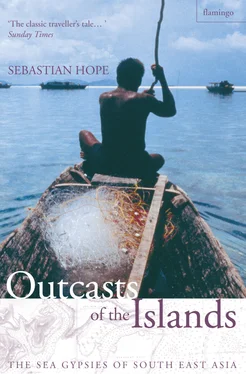‘Massage only?’
‘There are words.’
‘What kind of words?’ Sarani looked blank.
‘Are they magic words? Islamic words?’
‘No.’ Sarani knitted his brows. ‘But they are special words.’ He studied the bedspread, tracing the pattern with a thick finger.
‘And massage and words will make vanish her pain?’
‘ Kalau Tuhan menolong , if Tuhan helps.’ What the nature of Sarani’s power was, whether it was given or learned or acquired, its extent, remained unclear to me. More puzzling was his concept of Tuhan. This Malay word for the ‘Supreme Being’ is most often used as a name for Allah. Was that the way Sarani was using it? He had used the same phrase when I questioned him about the washing ceremony I had witnessed outside Jayari’s house, ‘if Tuhan helps’, but it had not sounded like a translation of the Arabic insha’allah , ‘God willing’, then either. The Muslim deity wills things so; Sarani’s Tuhan helps.
When we met later I had already visited the pharmacy. Sarani was impatient for his medicine.
‘So you tear it open like this, and inside is one fruit.’ My primer offered no suggestion on the correct number qualifier for condoms. Buah , ‘fruit’ seemed closer than biji , ‘seed’.
I looked at the wrapper for instructions in Malay, a diagram even – something that would help me explain – but the picture on the front of a fully-dressed modern-looking Malaysian couple embracing would not exactly spell it out for Sarani. The condom emerged from its amnion, glistening and wrinkled, and unfurled itself on my palm. I held it out for Sarani to see. The teat erected itself expectantly.
‘It looks like a jellyfish,’ was his only comment. I had a long way to go.
‘And then you put this on the end of your botok , when it is big, before you put it into the puki ,’ I had learnt the right words. I had the condom over two fingers. I was trying to remember the wording of the Durex instruction booklets I had studied in anticipation during my adolescence. ‘You have to make sure there is no air in the top.’ I think that was the way it went. On an empirical note: ‘You have to make sure it is the right way up. Then you roll it down like this, but you have to be careful the bit you have unrolled does not go under the bit you are unrolling or else it won’t unroll any more. You see?’
‘What?’ said Sarani.
‘Never mind. So you roll it all the way to the bottom, as far as it will go, and then you are ready for playing love.’
‘And after?’
‘And after the mani has come out, and before your botok goes small again, you take it out of the woman.’ I couldn’t bring myself to say ‘Minehanga’. ‘It is best to hold the bottom when you are doing this.’
‘And then I can wash it?’
I told him he must throw it away; at least the condom, if not the wrapper, was biodegradable. I told him that if the wrapper was broken, or punctured, then the medicine would not work and he must throw it away without using it. I threw my demonstration model in the bin to underline the point. He nodded and stowed the packets in the belt-bag under his shirt. It seemed a little late in the day to be giving contraception lessons to a father of eleven, but perhaps my absence from the boat that night would give him the opportunity to practise. We went to look for hurricane lamp parts. Maybe he was planning a night of fishing instead.
In the late afternoon when the tide had again covered the stinking flats, I waved goodbye to Sarani and his family and hangers-on, as he cast off from the kampung air , Pilar’s boat laden with supplies, and Sumping Lasa said her first words to me. As they backed away from the dock, she came running out onto the bow deck in her best frock still wearing her flip-flops, and she waved to me. ‘Bye-bye,’ she said. ‘Bye-bye.’
The greatest luxury ashore was access to a bathroom, though I had quickly accustomed myself to arrangements on the boat. You pee over the side, you crap through the gap in the stern boards, left for that purpose. Sarani would say, ‘ Mesti buang tahi , must throw out shit,’ as though ditching ballast, and move aft to the dark stern with the baler for company. Minehanga always had the cover of her sarong. The children were sat over the edge of the gunwale while they off-loaded, their bottoms washed with sea water, the planks washed down with sea water when they did not quite reach the gunwale in time. Sarani could pee over the side from a squatting position by the gunwale, lifting up one leg of his loose fisherman’s trousers. I did not have the balance to be able to do this on a rocking boat. I was forced to stand. My appearance on the bow deck at any time would draw curious stares from the other boats. To stand up there with your old boy out, trying to keep your balance and ignore the watching eyes, the comments ‘Look, he pees standing up!’ – cannot pee, more like – was not an easy matter.
Washing was done at the stern, sluicing with sea water and rubbing with the free hand, a rinse with fresh water if stocks allowed. Sarani’s skin felt dubbinned to the touch, oiled against the sun and the sea. The bundles of clothes gave off the smell of clean unperfumed bodies; the boards were smoothed by the rubbing of skin, and held the odour of people; the pillows had the comforting scent of hair. In the Semporna Hotel, the foam bedding smelt of night-sweat.
I met Ujan and Mus at the Marine Police post, and the three of us adjourned to the bar. The conversation turned to fish-bombing.
‘You know what they use? These,’ said Ujan, indicating the beer bottles. ‘Maybe you will see these ones again at Kapalai in a couple of days. They fill them with a mixture of fertiliser and petrol. Then they plug a detonator into the top, light it, wait a moment, throw it into the water, and boom.’ He laughed as he tapped the top of the lager bottle with the bottom of the other and froth raced up the neck and out, Mus hurrying to tip it into his glass. ‘You have seen the men who waited too long? In the market maybe? No right arm and a lovebite on the side of their face?’ Ujan poured half-and-halves, Carlsberg and Guinness.
‘It is very difficult to catch these people,’ Mustafa confided. ‘On the sea, they can see us coming a long way off. They just throw the bombs overboard, pick up their fishing lines, and move onto the shallow reef where we cannot follow them. The materials are so cheap and easy to find. You can make one at home. You have to get the proportions right, or else it is very unstable, but they know how to mix it. The detonators come from the Philippines, but they are home-made too, made from a bundle of matches around a small charge of explosive. You can buy them here for one ringgit each. We try to catch the people who bring the detonators across, but they are very small,’ he held up his little finger. ‘You could fit ten into this cigarette box. Oh yes, we catch plenty, but there are always enough that get through. What can we do? It is a big ocean. Sarani doesn’t bomb fish, does he?’
‘No, he says it is the Suluk people.’
‘Bajau also, Indonesian also, mainly it is the illegal immigrants.’ The immigration problem extends Malaysia-wide. Illegal immigrants were blamed for most anti-social crimes, I noticed from the newspapers: prostitution, mugging, smuggling, drug-dealing, car theft, burglary. Those who broke no further law after their illegal entry still faced deportation, in theory at least. Occasionally there were sweeps, ‘checkings’, followed by mass deportations, but the immigration laws are flouted at every level, from the ruling party handing out Malaysian documents to Muslim Filipino and Indonesian migrants at election time, to illegal Bangladeshi construction workers on prestige projects like the new Kuala Lumpur airport and the twin Petronas Towers, to loggers and plantation labourers in Sabah.
Читать дальше












